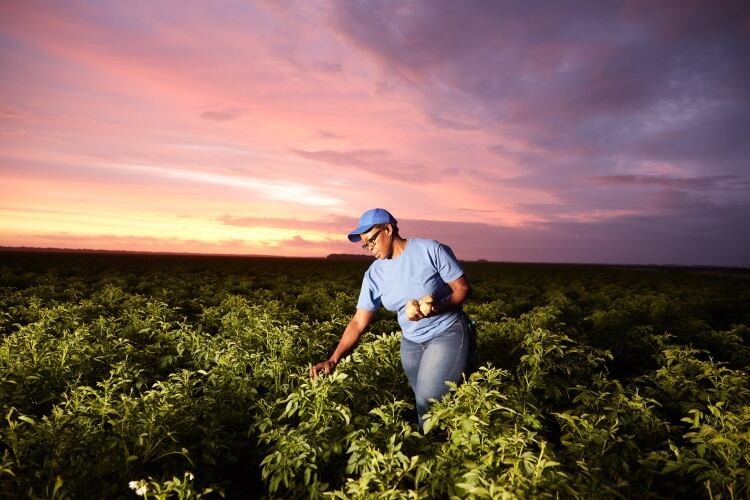The Quaker breakfast cereal and Frito-Lay maker is planning to drive regenerative farming practices across seven million acres, which roughly equates the amount of land used around the world to grow crops and ingredients for its products.
PepsiCo said the effort will eliminate an estimated three million tons of greenhouse gas (GHG) emissions by the end of the decade. It will also improve the livelihoods of more than 250,000 people in its agricultural supply chain and means the snack giant will be able to sustainably source 100% of its key ingredients.
“Any plan to tackle the urgent challenges facing the global food system must address agriculture, the source of nourishment for billions of people and a key lever to address climate change and inequality,” said PepsiCo chairman and CEO Ramon Laguarta.
“As one of the world’s leading food and beverage companies, a resilient food system is essential to our business, and with our scale, we have an opportunity and responsibility to drive meaningful change.
“PepsiCo’s Positive Agriculture agenda prioritises investment, innovation, and robust collaboration with our farming partners to deliver impact around the world. Working together, we can reduce our collective carbon footprint, feed a rapidly growing population, and provide meaningful economic opportunities for more people.”
The agenda is the next step in its ‘PepsiCo Positive’ journey and follows the company’s recent pledge to double its science-based climate goal, which targets a reduction of absolute GHG emissions across its value chain by more than 40% by 2030, as well as achieving net-zero emissions by 2040.

Sustainable farming
The Positive Agriculture plan builds on nearly a decade of progress the company has made with its Sustainable Farming Programme (SFP), which has seen it collaborating with farmers across 60 countries to adopt practices that build resilience and restore ecosystems. In the US, for example, PepsiCo has worked with farmers to plant cover crops on over 85,000 acres, which has seen up to a 38% net reduction in on-farm greenhouse gas emissions, including soil carbon sequestration.
The plan will expand these efforts to another 500,000+ acres of US farmland by the end of 2021. PepsiCo will also continue to grow its global network of Demonstration Farms, which enable peer-to-peer learning. In 2020, the network comprised more than 350 farms, with 80% of them adopting regenerative farming practices.
This will extend PepsiCo’s support and improve the livelihoods of more than 250,000 people within its global agricultural supply chain. PepsiCo will focus its work on the most vulnerable farming communities, including smallholder farmers and farm workers, women and minority farmers.
To achieve this, PepsiCo has partnered with organisations like the US Agency for International Development, Inter-American Development Bank, CARE, National FFA Organization and the National Black Growers Council.
Already stepping up to the mark
The company’s Positive Agriculture plan is already embedded in the lifecycle of many of its iconic brands.
For example, in the UK, the Walkers brand has partnered with CCm Technologies to introduce technology that uses potato peelings to manufacture low-carbon, nutrient-rich fertilizer. Use of this fertilizer is expected to reduce Walkers’ carbon emissions from growing potatoes by 70%.
The Quaker brand launched the ‘Opti-Oat’ initiative, which uses over one million data points to guide farmers in how to grow ‘perfect oats’, improving yields and creating a more sustainable source of oats.
Renewed targets
PepsiCo currently sources crops across 60 countries, which supports over 100,000 jobs along its agricultural supply chain.
As of the end of 2020, PepsiCo’s direct-sourced crops (potatoes, whole corn, oats and oranges) are 100% sustainably sourced in 28 countries. Globally, nearly 87% of direct crops are sustainably sourced through PepsiCo’s SFP.
It is now trained on sustainable sourcing 100% of its key ingredients, not only the direct-sourced crops, but also ingredients from third parties, such as vegetable oils and grains.
The company already sustainably sources 100% of its potatoes and oats for its Lay’s and Quaker brands in North America.
Additionally, it achieved its goal to source 100% Bonsucro certified sustainable cane sugar globally by 2020 and achieved more than 99% physically certified palm oil by the Roundtable on Sustainable Palm Oil.
PepsiCo has a strict commitment to no deforestation, no development on peat, and no exploitation of indigenous people, workers and local communities, and recently pledged an increased focus on transformation of the palm oil sector.
“Through our Sustainable Farming Programme and ongoing work with tens of thousands of farmers, we've seen first-hand the ability to drive solutions within our agricultural communities, resulting in nature-based outcomes,” said Jim Andrew, chief sustainability officer of PepsiCo.
“Today, we’re accelerating our Positive Agriculture agenda because we know we have to do even more to create truly systemic change. By focusing on regenerative agriculture practices at the local level to improve soil health, we can build a stronger foundation for our products and help make the entire food system more sustainable.”
Globally accepted standards
PepsiCo is calling for an industry-wide accepted measurement of regenerative agriculture standards.
Until established, the company said it will measure its progress towards its Positive Agriculture goals by tracking acres and people engaged in the initiative and, over time, the impact on five key outcomes, including building soil health and fertility; sequestering carbon and reducing emissions; enhancing watershed health; increasing biodiversity; and the improvement of farmer livelihoods.
For example, PepsiCo is currently engaged with the World Wildlife Fund (WWF) to develop a method for setting science-based targets for water that consider the benefits of regenerative and resilient farming systems and practices on water quality and water quantity.
“Working across the supply chain is necessary if we are to transform the food system, reduce carbon emissions, support healthy watersheds, restore biodiversity, and improve livelihoods,” said Sheila Bonini, senior VP of Private Sector Engagement at World Wildlife Fund.
“It’s encouraging that PepsiCo is announcing an approach to their agricultural supply chains that can be positive for both nature and people and WWF looks forward to partnering with PepsiCo on an ambitious and scaled regenerative agriculture agenda.”
The company has also partnered with the World Economic Forum to launch the Food Innovation Hubs to catalyse system change through the development of local food systems that are inclusive, efficient, sustainable and nutritious.





